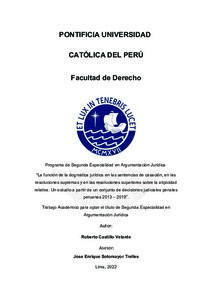| dc.contributor.advisor | Sotomayor Trelles, José Enrique | |
| dc.contributor.author | Castillo Velarde, Roberto | |
| dc.date.accessioned | 2023-05-08T17:35:33Z | |
| dc.date.available | 2023-05-08T17:35:33Z | |
| dc.date.created | 2022 | |
| dc.date.issued | 2023-05-08 | |
| dc.identifier.uri | http://hdl.handle.net/20.500.12404/24890 | |
| dc.description.abstract | La dogmática jurídica y la jurisprudencia peruana utilizan el siguiente concepto
de atipicidad relativa “cuando la conducta no cumple con la hipótesis típica
conlleva al archivo del caso”; sin embargo, esta figura jurídica no conlleva al
archivo, sino busca que el hecho relevante sea subsumido en otro tipo penal.
En base a ello se tiene la pregunta de investigación ¿qué función cumple la
dogmática jurídica en las decisiones judiciales penales peruanas en el periodo
2013 – 2019?
Asimismo, el objetivo general radica en evaluar esta función y los objetivos
específicos versan sobre el análisis que cumple la función de control y la función
técnica de la dogmática jurídica en esas decisiones judiciales.
Se tiene como resultado que la función que cumple la dogmática jurídica no es
coherente con su naturaleza, pues no cuenta con una posición sólida; asimismo,
no cumple su función de control ni su función técnica, al no verificarse su
compatibilidad lógica con otros enunciados dogmáticos y normas jurídicas.
Del análisis realizado a las muestras sobre la interpretación y aplicación de la
atipicidad relativa se tiene que en el 71.4% se concluyó con el archivo del
proceso y en el 28.6% se dispuso la continuación del mismo, lo que evidencia la
falta de seguridad jurídica y la contradicción en la predictibilidad de las decisiones
judiciales.
El presente trabajo da una posición jurídica distinta, pues la atipicidad relativa
debe remitirse a otro tipo penal y solo cuando se encuentren ante una atipicidad
absoluta esta generaría el archivo del proceso. | es_ES |
| dc.description.abstract | Legal dogmatics and Peruvian jurisprudence use the following concept of relative
atypicality "when the conduct does not comply with the typical hypothesis, it leads
to the filing of the case"; however, this legal figure does not lead to the file, but
seeks that the relevant fact is subsumed in another criminal type
Based on this, the research question is: what role does legal dogmatics play in
Peruvian criminal judicial decisions in the period 2013 – 2019?
Likewise, the general objective lies in evaluating this function and the specific
objectives deal with the analysis that fulfills the control function and the technical
function of legal dogmatics in these judicial decisions.
The result is that the function fulfilled by legal dogmatics is not consistent with its
nature, since it does not have a solid position; Likewise, it does not fulfill its control
function or its technical function, since its logical compatibility with other dogmatic
statements and legal norms has not been verified.
From the analysis carried out on the samples on the interpretation and application
of the relative atypicality, 71.4% concluded with the filing of the process and
28.6% ordered its continuation, which shows the lack of legal certainty and the
contradiction in the predictability of judicial decisions.
The present work gives a different legal position, since the relative atypicality
must be referred to another criminal type and only when they are faced with an
absolute atypicality this would generate the file of the process. | es_ES |
| dc.language.iso | spa | es_ES |
| dc.publisher | Pontificia Universidad Católica del Perú | |
| dc.rights | info:eu-repo/semantics/openAccess | es_ES |
| dc.rights.uri | http://creativecommons.org/licenses/by-sa/2.5/pe/ | * |
| dc.subject | Lógica jurídica--Perú | es_ES |
| dc.subject | Metodología jurídica--Perú | es_ES |
| dc.subject | Derecho penal--Jurisprudencia--Perú | es_ES |
| dc.subject | Seguridad (Derecho)--Perú | es_ES |
| dc.title | La función de la dogmática jurídica en las sentencias de casación, en las resoluciones supremas y en las resoluciones superiores sobre la atipicidad relativa. Un estudio a partir de un conjunto de decisiones judiciales penales peruanas 2013 – 2019 | es_ES |
| dc.type | info:eu-repo/semantics/bachelorThesis | es_ES |
| thesis.degree.name | Segunda Especialidad en Argumentación Jurídica | es_ES |
| thesis.degree.level | Título Profesional | es_ES |
| thesis.degree.grantor | Pontificia Universidad Católica del Perú. Facultad de Derecho. | es_ES |
| thesis.degree.discipline | Argumentación Jurídica | es_ES |
| renati.advisor.dni | 45486817 | |
| renati.advisor.orcid | https://orcid.org/0000-0002-1155-0249 | es_ES |
| renati.author.dni | 31038805 | |
| renati.discipline | 421029 | es_ES |
| renati.level | https://purl.org/pe-repo/renati/level#tituloSegundaEspecialidad | es_ES |
| renati.type | https://purl.org/pe-repo/renati/type#trabajoAcademico | es_ES |
| dc.publisher.country | PE | es_ES |
| dc.subject.ocde | https://purl.org/pe-repo/ocde/ford#5.05.02 | es_ES |







